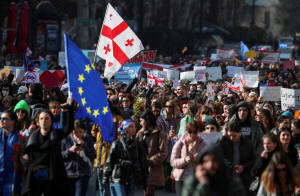Georgian ruling party withdraws 'foreign agents' bill but faces more
protests
 Send a link to a friend
Send a link to a friend
 [March 09, 2023]
By Felix Light [March 09, 2023]
By Felix Light
TBILISI (Reuters) -Georgia's ruling party said on Thursday it was
dropping a bill on "foreign agents" after two nights of violent protests
against what opponents said was a Russian-inspired authoritarian shift
that imperilled hopes of the country joining the European Union.
The Georgian Dream ruling party said in a statement it would
"unconditionally withdraw the bill we supported, without any
reservations". It cited the need to reduce "confrontation" in society,
while also denouncing "lies" told about the bill by the "radical
opposition".
However, opposition leaders said the protests would resume at 7 p.m.
(1500 GMT). Giga Lemonjava, a representative of the Droa party, said
they were demanding that the government formally denounce the bill and
release all those detained during the protests.
The Black Sea country of 3.7 million people has seen frequent political
upheaval since winning independence from the Soviet Union in 1991,
including a peaceful "Rose Revolution" in 2003 and a calamitous war
against Russia five years later.
The bill would have required Georgian organisations receiving more than
20% of their funding from abroad to register as "foreign agents" or face
fines.

'FOREIGN INFLUENCE'
Government officials said the proposals were necessary to root out
"foreign influence" and "spies" from Georgia's political scene, arguing
that Georgians had the right to know who funds non-government
organisations working there.
The opposition said it was a local version of a Russian law that
President Vladimir Putin has used to crush dissent for more than a
decade.
"It was a Russian law that had to be recalled and should not have gone
through parliament under any conditions", said Nika Oboladze, a
32-year-old Tbilisi resident.
"Those who proposed the law are responsible for all this mess. Because
90% of Georgians support European integration and nothing should stop
that," he added.
Kremlin spokesman Dmitry Peskov said Moscow was "concerned" by events in
Tbilisi, and said that the Georgian bill bore no relation to Russian
laws.
"The Kremlin didn't inspire anything there, the Kremlin has absolutely
nothing to do with it. ... If I understand it correctly, one version was
very similar to an equivalent law in the United States," Peskov said.
[to top of second column]
|

Participants march during a protest
against a draft law on "foreign agents", which critics say
represents an authoritarian shift and could hurt Georgia's bid to
join the European Union, in Tbilisi, Georgia, March 8, 2023.
REUTERS/Irakli Gedenidze

The European Union's delegation to Georgia welcomed the decision to
withdraw the bill, writing on Twitter: "We encourage all political
leaders in Georgia to resume pro-EU reforms, in an inclusive &
constructive way."
Parliament gave the draft law initial approval on Tuesday but tens
of thousands of protesters then gathered outside parliament, some
throwing petrol bombs, stones and plastic bottles at police. The
authorities said dozens were detained.
Police used tear gas, water cannon and stun grenades to break up a
second night of protests on Wednesday.
The bill has deepened a rift between Georgian Dream, which has a
parliamentary majority, and President Salome Zourabichvili, a
pro-European who has moved away from the party since being elected
with its support in 2018.
Zourabichvili had said she would veto the bill, though parliament
can override her.
Georgia's opposition has long criticised Georgian Dream for what it
sees as excessive closeness to Moscow. Anti-Russian feeling runs
high in Georgia over Moscow's backing for separatists in two
breakaway regions, which led to a short war between the two
countries in 2008.
The bill had angered supporters of Georgian membership of the EU,
after officials in Brussels condemned the draft law and said it
would complicate Tbilisi's path to joining the bloc.
Opinion polls show a consistent majority of Georgians in favour of
joining the European Union and NATO. All major parties, including
Georgian Dream, support the idea.
Last year, Brussels declined to grant Georgia EU candidate status
alongside Moldova and Ukraine, citing stalled political and judicial
reforms.
(Additional reporting by David Chkhikvishvili, Jake Cordell and Ben
Tavener; writing by Felix Light and Mark Trevelyan; Editing by Angus
MacSwan)
[© 2023 Thomson Reuters. All rights
reserved.]This material may not be published,
broadcast, rewritten or redistributed.
Thompson Reuters is solely responsible for this content.
 |